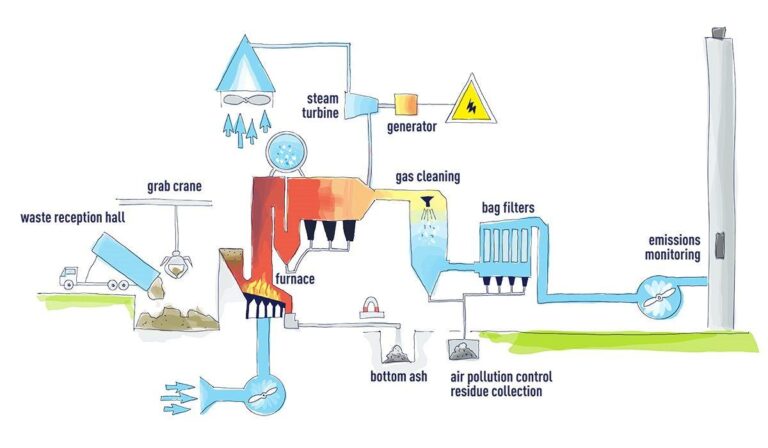SUEZ Optimises Energy Recovery from Waste in Toulouse: A Step Towards Sustainable Urban Management
In a significant advancement for sustainable urban waste management, SUEZ Group has announced the successful optimisation of its energy recovery processes at the waste treatment facility in Toulouse. This initiative, aimed at maximising the conversion of waste into renewable energy, underscores SUEZ’s commitment to enhancing resource efficiency and reducing the environmental impact of waste disposal. As cities around the globe grapple with rising waste generation and energy demands, SUEZ’s innovations present a promising solution for integrating environmental responsibility into urban infrastructure. The improvements in Toulouse not only highlight the company’s expertise in waste management but also set a benchmark for other municipalities striving for a greener future.
SUEZ Implements Innovative Technologies to Enhance Energy Recovery in Toulouse
SUEZ has unveiled a series of pioneering advancements aimed at maximizing energy recovery from waste in Toulouse. By integrating cutting-edge technologies, the company aims to transform waste management into a sustainable energy solution. Key initiatives include:
- High-efficiency waste-to-energy systems that convert landfill waste into electricity.
- Smart monitoring tools that optimize operational efficiency and reduce energy costs.
- Enhanced recycling processes that better segregate materials, increasing their energy recovery potential.
With these innovations, SUEZ is not only contributing to local energy needs but also aligning with environmental responsibilities. The focus on renewable energy sources is designed to foster a circular economy that benefits both the community and the planet. To illustrate the impact, the following table highlights the projected outcomes of the new initiatives:
| Outcome | Projected Impact |
|---|---|
| Reduction in landfill waste | 30% decrease by 2025 |
| Increase in energy produced | 15 GWh annually |
| Reduction in carbon emissions | 25% decrease by 2030 |
Significant Environmental Impact: Reducing Carbon Footprint Through Waste Management
In recent developments, SUEZ has enhanced the energy recovery process from waste materials in Toulouse, showcasing a proactive approach to environmental responsibility. By optimizing waste treatment methodologies, SUEZ aims to significantly lower the carbon footprint associated with landfill operations. This involves harnessing advanced technologies that convert waste into renewable energy, consequently reducing greenhouse gas emissions. The benefits of efficient waste management not only contribute to a cleaner environment but also propel local energy systems towards sustainability.
Key strategies employed by SUEZ include:
- Enhanced Recycling: Prioritizing materials recovery to minimize waste disposal.
- Energy Generation: Converting non-recyclable waste into electricity and heat.
- Community Engagement: Educating residents about the importance of waste separation.
| Strategy | Impact |
|---|---|
| Waste-to-Energy Conversion | Reduces landfill dependency by 30% |
| Increased Recycling Rates | Boosts local recycling by 20% |
Collaborative Efforts with Local Authorities to Drive Sustainability Initiatives
SUEZ is actively collaborating with local authorities in Toulouse to enhance sustainability initiatives through innovative energy recovery systems. By harnessing cutting-edge technology, the organization aims to optimize its waste-to-energy processes. This collaboration involves a multi-faceted approach, focusing on:
- Community Engagement: Involving local residents in educational programs about waste management.
- Data Sharing: Providing local officials with insights that guide policy decisions related to waste sustainability.
- Joint Funding: Securing grants and subsidies for green projects that benefit the community.
As part of these efforts, SUEZ is also establishing benchmarks to track progress and effectiveness. A recent initiative demonstrates the positive impact of combining resources with local governance to not only reduce waste but also generate renewable energy. Below is a summary of key metrics from the ongoing projects:
| Metric | Current Status | Goal |
|---|---|---|
| Waste Diverted from Landfill | 60% | 75% |
| Renewable Energy Generated | 5 MW | 10 MW |
| Community Engagement Events | 12 | 20 |
Future Prospects: Expanding Energy Recovery Solutions Across France
As SUEZ champions energy recovery initiatives in Toulouse, the potential for expanding these solutions across France is becoming increasingly evident. By leveraging advanced technology and innovative processes, energy extraction from waste not only mitigates environmental impact but also contributes substantially to local energy needs. Key areas of focus include:
- Strategic Partnerships: Collaborating with local municipalities and businesses to amplify waste-to-energy projects.
- Research and Development: Investing in new technologies that enhance energy efficiency and reduce emissions.
- Public Awareness Campaigns: Educating communities on the benefits of energy recovery and sustainable waste management.
Furthermore, SUEZ’s model can serve as a blueprint for statewide implementation, fostering sustainability across various sectors. As interest grows, the establishment of a dedicated task force could address regulatory challenges and streamline processes, ensuring broader adoption of energy recovery solutions. The projected impact includes:
| Projected Benefits | Estimated Impact |
|---|---|
| Reduction in Landfill Waste | 30% decrease by 2025 |
| Increase in Renewable Energy Production | 15% contribution to local grids |
| Job Creation in Green Sectors | 1,000 new positions statewide |
Wrapping Up
In conclusion, SUEZ’s recent initiative in Toulouse marks a significant advancement in the realm of energy recovery from waste management. By implementing innovative technologies and sustainable practices, the SUEZ Group not only enhances local energy production but also contributes to a greener future. This project exemplifies a growing commitment to transforming waste into a valuable resource, aligning with global sustainability goals. As cities grapple with increasing waste challenges, initiatives like this serve as a vital blueprint for fostering environmental stewardship and resilience. The success of this endeavor may well pave the way for similar projects in other urban centers, underscoring the potential for waste-to-energy solutions in the fight against climate change.




